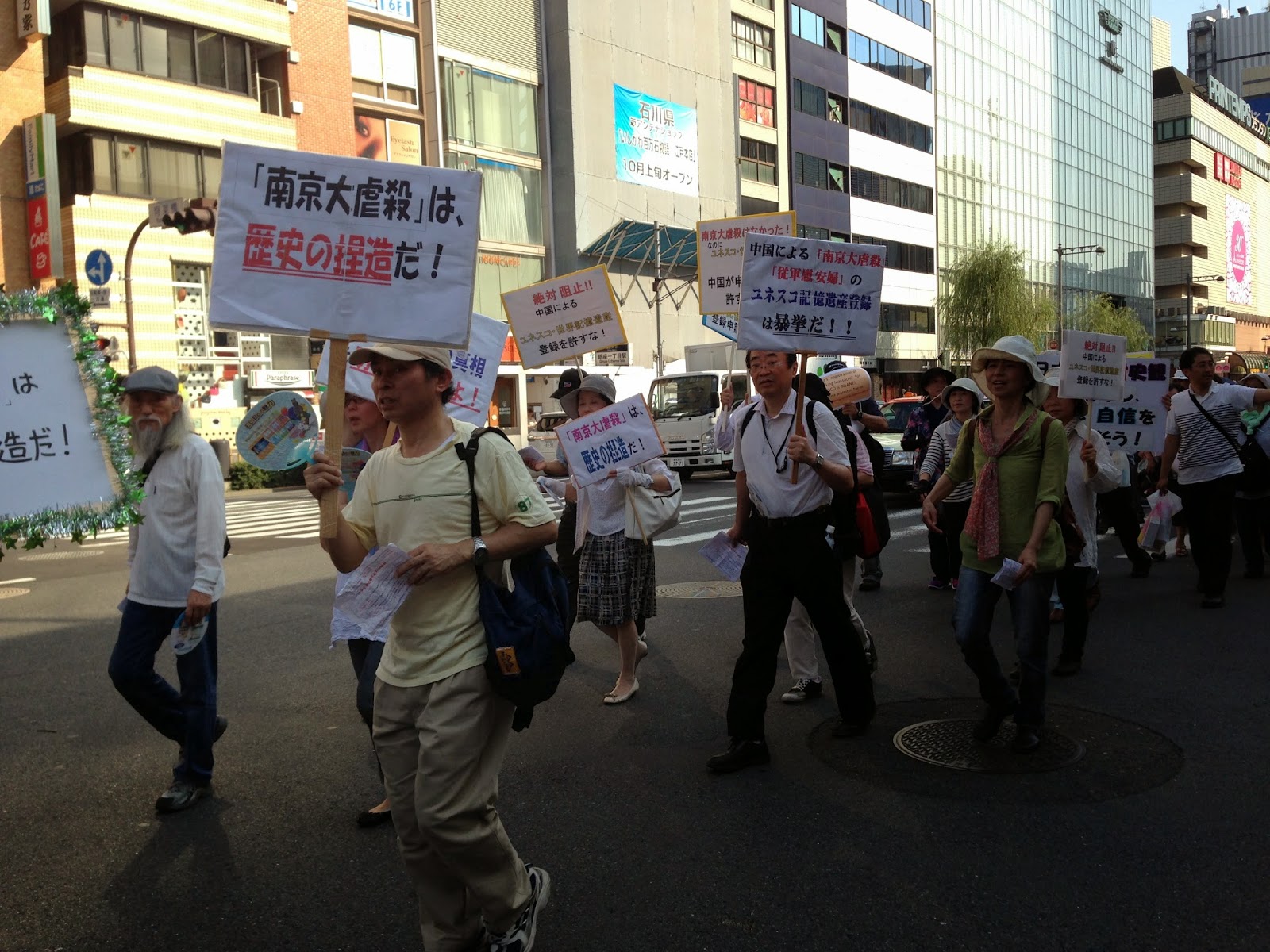I was dismayed the other day out in Ginza to see right wing protests. As a friend pointed out, I shouldn't be shocked there have been right wing protests in Ginza since... I don't know how long really but for many decades. I'm not sure that I've seen a "Nanjing Massacre is a fabrication sign" before, though it's certainly on the agenda of the the Japanese right wing. What disturbed me was how normal these people looked: they look like my neighbours. Usually rightwing people are associated with black vans, blaring military music and have a thuggish image. (Perhaps the latter is just my prejudice.)
Japan's at a historical juncture: changes to the constitution have occurred by stealth with an executive "reinterpretation" of the Constitution that allows Japan to participate in other people's conflicts; the Special Secrets Act was passed at the end of last year which means that releasing government secrets is punishable by 15 years in gaol but there is no guide on what constitutes a secret; the PM has authorized the sales of weapons to foreign countries despite the previous understanding of Japan having a "pacifist" constitution which forbad it; the National Broadcaster, NHK, has a number of the board who are know rightists who support historical revision particularly in regard to "comfort women". Futhermore, prefectural assemblies are beginning to follow the central govts. wish to revise history and restore Japanese to being a country with a glorious history; Gunma prefecture is removing a statue that memorializes Korean wartime slave labour.
Young people in Japan, in the main, are not taught history as a topic that can be discussed and analyse. There is minimal knowledge of the occupation crimes. In my Japanese history class next semester, rather than starting in the past, I'm planning to start the course in the present with current controversies and go back from today. I want students to do their own investigations by going back to primary sources and reading the voices from the time. I was fortunate to pick up a bilingual autobiography of a Japanese soldier in Sabah (Sandakan). If the nationalists were to listen to voices from the foot soldiers of the past, they wouldn't be carrying on with such blind, mindless nationalism.
 |
| This was a protest in Ginza in June. More men, more thuggish, more hinomaru (rising sun) Japanese flag. |
* I've been to the new and the old Nanjing massacre museums in 1999 and 2008 respectively. As disdainful as I am of these protesters, I'm also critical of the Chinese govt. for intensely politicizing the matter when they built the new museum. It should not be a place for political point scoring.






4 comments:
African politics is make more sense than Japanese politics, nowadays. It's that bad ...
We have a 14 years old Japanese exchange student staying with us right now. There was an item about the Cowra POW breakout. I wonder what she thought of that, if she even paid any attention to it.
For some reason I can't comment on my mobile phone.. and for some reason I only just saw Rurousha's comment now...
That's a damning indictment of Japan Ru...
Andrew - very interesting to have an exchange student! I looked at the Cowra breakout with an Australian Studies class I took this year. They had no idea that there were Japanese POWs in Aus. I don't think they'd ever given any thought to it (not really there fault). They found the following video & the two that follow it quite interesting (they wanted to see it twice at any rate). I suspect the average Australian student wouldn't know much about it either.
It was a bit of a shock to me going to the Aus. war memorial last time I was back, and in a way the nationalism was not so different to Yasukuni's. Yasukuni spends a lot of time explaining the reasons for the war e.g. sanctions, and the hypocrisy of imperialism. The Aus. War memorial didn't really provide any context for the Pacific War.
The Left in post war Japan is very invested in pacifism; the right is invested in restoring national glory. They converge on the topic of victimhood.
http://aso.gov.au/titles/documentaries/breakout/clip1/
I seem to recall learning about the Cowra breakout in junior high school history, but then we also learned that Menzies was a warmonger (later I learned he got out of military service himself) and the context of terms like jingoism and nationalism with regards to war. I'm not sure that kind of knowledge would be welcomed in the current environment where you are either on Team Australia or the enemy.
Post a Comment